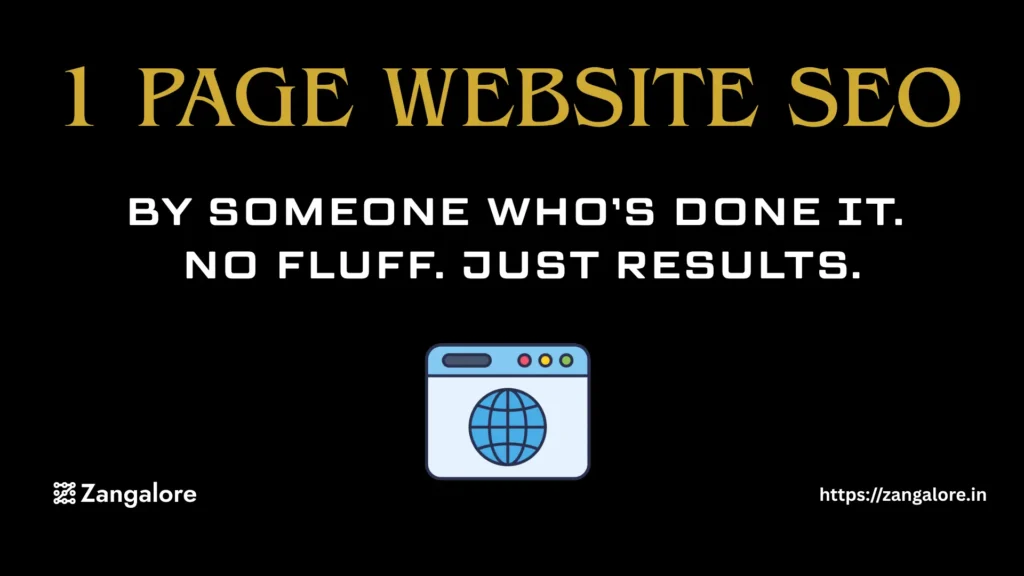By someone who’s done it. No fluff. Just results.
Let’s get real. You don’t need a 100-page website to rank on Google. You don’t even need 10. One solid, well-structured, and highly targeted page can do the job if you do it right.
Here’s how to nail single page website SEO without spinning your wheels.
What Is a Single-Page Website?
A single-page website is exactly what it sounds like. One page that holds all your content, your hero section, your services, about, contact, everything.
It’s fast, simple, and easy to manage. But when it comes to SEO on one-page websites, you have less space to work with. That’s why your strategy has to be sharp.
Pros & Cons of Single Page Sites
Pros
- Easy to build and maintain
- Loads fast (if optimized)
- Great for mobile
- Straightforward navigation
Cons
- Limited keyword targeting
- Harder to build topical authority
- It can get cluttered if not structured well
- Fewer internal linking opportunities
If you’re running a small service business, personal brand, or MVP, a 1 page website SEO strategy can still get real results.
Keyword Mapping & Targeting
This is where most people mess up.
You only get one page. So, picking the right keyword is everything.
Here’s how you choose:
- Go after low to medium competition
- Find keywords with transactional or commercial intent
- Make sure it’s broad enough to describe your full offering
Example:
Don’t go with “marketing” – that’s way too broad.
Try “freelance digital marketing services India” – specific, commercial, and still has volume.
Once you have your primary keyword, map related variations across your page sections. That’s how you expand reach without adding new pages.
On‑Page Structure: Headings & Anchors
Think of each section as a mini-page within your one-pager. You want to structure them like this:
- Hero Section: Includes your main keyword in H1
- About You/Your Business: Use natural keyword variations
- Services: Treat each service like its own keyword target
- Testimonials: Add real, keyword-relevant reviews
- FAQs: Great spot to insert long-tail variations
- Contact: Include local keywords if relevant
Also, use anchor links (like #services or #contact) in your navigation. It helps with both user experience and Google’s understanding of the structure.
SEO on a single-page website starts with treating your one page like a bunch of mini-pages stitched together with clean navigation.
Mobile‑First & Page Speed Optimizations
Let’s not overthink this.
- Your page must look clean on mobile. That’s non-negotiable.
- Compress images.
- Use fast-loading fonts.
- Don’t rely on bloated themes or animations.
Page speed is one of the most overlooked parts of single-page website SEO optimization. If your site takes forever to load, nothing else matters.
Internal & External Linking Strategies
Yes, internal linking is limited with a single page. But you can still use anchor links and link back to key sections.
External linking, though? That’s in your control.
- Link out to credible sources
- Add yourself to niche directories
- Publish guest posts on relevant blogs
- Share your content on LinkedIn, Quora, Reddit– wherever your people hang out
One-page site SEO doesn’t mean ignoring links. Backlinks still move the needle.
SEO for Single‑Page Applications (SPAs)
If you’re running a JavaScript-heavy site (like with React or Vue), SEO gets trickier. Google has gotten better at crawling SPAs, but not perfect.
To make sure your single-page site SEO doesn’t tank:
- Use pre-rendering or server-side rendering
- Make sure metadata updates dynamically
- Implement structured data properly
- Test with Google Search Console’s URL inspection
Don’t assume it’ll just work. Test everything.
When to Expand to Multi‑Page
Here’s the thing. A one-page website and SEO work great together up to a point.
If you’re:
- Offering multiple distinct services
- Targeting different geo locations
- Creating educational content or blog posts
…then it might be time to expand. Because SEO for single-page vs. multiple pages comes down to flexibility. A single page is tight, efficient, and simple. But it does hit a ceiling. This is especially true when you’re dealing with GEO vs SEO priorities. If you’re trying to rank for multiple cities or regions, cramming all those keywords into one page gets messy fast. In that case, going multi-page makes more sense one location, one page.
Bottom line:
You don’t need a complex site to rank. But you do need a smart plan. A one-page website SEO strategy forces you to focus and that’s usually a good thing.
Put in the work, and your single page can punch well above its weight.
Let it rank. Let it convert. Let it do the job.

I’m Nitin Pandey, an SEO expert with 5+ years of experience helping brands grow online through smart digital marketing, higher Google rankings, and results-driven strategies that work.


